Voice of the Future
Issue: Sexually transmitted infections (STIs)
21 May 2013 article
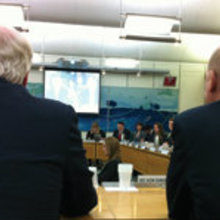
Four outstanding young Microbiology Society members met MPs and government scientific advisers at the annual Voice of the Future event in Parliament this March. They heard first-hand – and minus the usual journalistic spin – what our political leaders think about science. Here they record their experiences.
Recent events, such as the H5N1 influenza censorship dispute, drew my attention to the challenging and often abrasive interface between politics and science. Compared to other sectors of the UK economy, these two share a particularly unusual relationship with scientists both advising on policy decision-making, whilst simultaneously having their own working environment affected
by such decisions.
Considering this, it was a fantastic opportunity to be able to attend the Voice of the Future event courtesy of the Microbiology Society. Bringing together a range of political figures, from the Government Chief Scientific Advisor to Select Committee members and David Willetts MP, gave insight into the whole spectrum of scientific influences within government.
Putting young scientists centre-stage meant that a huge breadth of questions were thrown into the debate, ranging from gender inequality issues to the technicalities of a manned mission to Mars. The responses revealed some of the compromises required to balance UK scientific strategy, as well as the power that scientific advice wields over political decision-making.
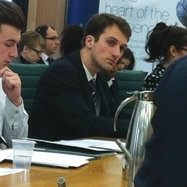
Within the group of delegates, there was a wide range of backgrounds and it was encouraging to see that the experience gained from the event would be taken back to a range of workplaces and locations across the UK.
Personally, I found it very rewarding to hear issues debated in an open and candid atmosphere, especially those affecting my own career. It was a pleasure to meet the other participants and reassuring to find that many of the challenges facing working scientists are shared, giving hope that, through consensus, we can bring about change. I appreciate the Society’s support for young scientists such as myself in attending events like this, providing an invaluable opportunity for us to broaden our horizons.
BEN BLEASDALE
It was really enjoyable to be able to take part in the recent Voice of the Future event at the House of Commons. Sitting on the chairs normally reserved for MPs and questioning those with responsibility for Government research budgets gave me, and others in the science community, a real sense of power. The speaker of the House of Commons, the Rt Hon John Bercow MP, whose warm words of welcome made one feel respected and privileged to be sitting within a great institution, opened the event. The live broadcasting by BBC Parliament added its own excitement to the day and the fact that the session was also broadcast via the internet meant that my parents at home in Finland could tune in without leaving their living room. I was positively impressed by the interest the attending MPs showed towards science and technology.
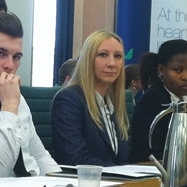
For me, the highlights of the 2.5h question time included discussions about landing on Mars and around cloning human beings. The scope of questions also allowed me to enjoy a debate on a subject that is close to my heart, namely antimicrobial resistance, which was jokingly referred to by a speaker as ‘the problem with bugs’. One notable aspect, which was highlighted throughout all the sessions of the day, related to issues around gender equality within science. It was clear from discussions at the event that our field faces an array of issues, both scientific and social. From what I saw, I can rest assured that our politicians and their advisors are aware of these issues and are keen to engage. All that is left now is for us scientists to get out and engage with policy-makers, who decide ultimately what the nation’s scientific funding priorities are.
LEENA NIEMINEN
I would like to thank the Minister for Universities and Science, the Shadow Minister for Universities and Science, the Government’s Chief Scientific Adviser, Sir John Beddington, and the honourable members of the Select Committee on Science and Technology for attending the Voice of the Future 2013 event.
I spoke on the rise of antimicrobial resistance and the urgent need to discover new drugs to prevent humankind entering a ‘post-antibiotic-era’. I was reassured to hear Sir John Beddington’s concern at the event and glad that he had already mentioned antibiotic resistance when answering a previous question regarding scientific challenges.
I personally have a large involvement in local politics and stood for the first time as a candidate for city council last year. Within my political party, there is a great amount of work being put in to field candidates that have had a job outside of politics. One thing that the event did highlight for me is that as successful as people like Sir John Beddington have been, scientists are only advisors to government and do not make the decisions themselves. The event has really inspired me to continue in my pursuit of elected office and perhaps, one day, use my knowledge of microbiology to help make informed scientific policy decisions.
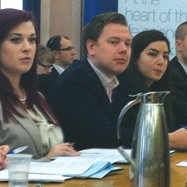
In addition to this, it was good that the event took place during National Science and Engineering week as I think it is fantastic that such a constructive dialogue is looking to be built between Parliament and our nation’s young scientists and engineers. I hope that in the future, the outcome of Sir Andrew Witty’s review exploring how universities can support growth in their regions by working with organisations such as Local Enterprise Partnerships, will recommend investment to allow young scientists like those at the event to link research with our nation’s decaying productive capabilities in order to kick-start much needed regional economic recovery.
SCOTT NICHOLSON
I am very grateful to the Microbiology Society for giving me the opportunity to attend this event. One of the highlights was being able to interact with policy and decision-makers first hand. It was very interesting to see how the witnesses responded to the questions and the themes of the questions as they reflected the current concerns of the scientific community. Issues that were raised repeatedly included antimicrobial resistance, the career development of young scientists, women in science, the impact of fees on the next generation of graduates and priority areas for science funding. It was great to be able to interact with the witnesses on Twitter beforehand and several seemed to be looking forward to being questioned by scientists!
Members of the Science and Technology Select Committee highlighted the value of good quality work experience to the future employability of science graduates. Stephen Mosley, MP for Chester, described a science degree as a ‘fantastic building block’ that allows you ‘to do whatever you want to in your future career’ – both are messages that I will certainly be passing on to the students I teach. Meeting the other scientists at the event was also a bonus.
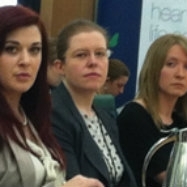
By speaking to people who work in policy, including the Society’s Policy Officer William Burns, I discovered possible ways to influence science policy and parliamentary discussion that I had not really thought about before. The only downside to the whole event was the lack of time. There were so many questions and so many worthy of follow-up discussion that it could have lasted all day; however, it was Budget Day and most of the witnesses had a busy afternoon planned! I hope the Society of Biology organises a similar event next year.
ALISON GRAHAM
Image: William Burns, SGM.
